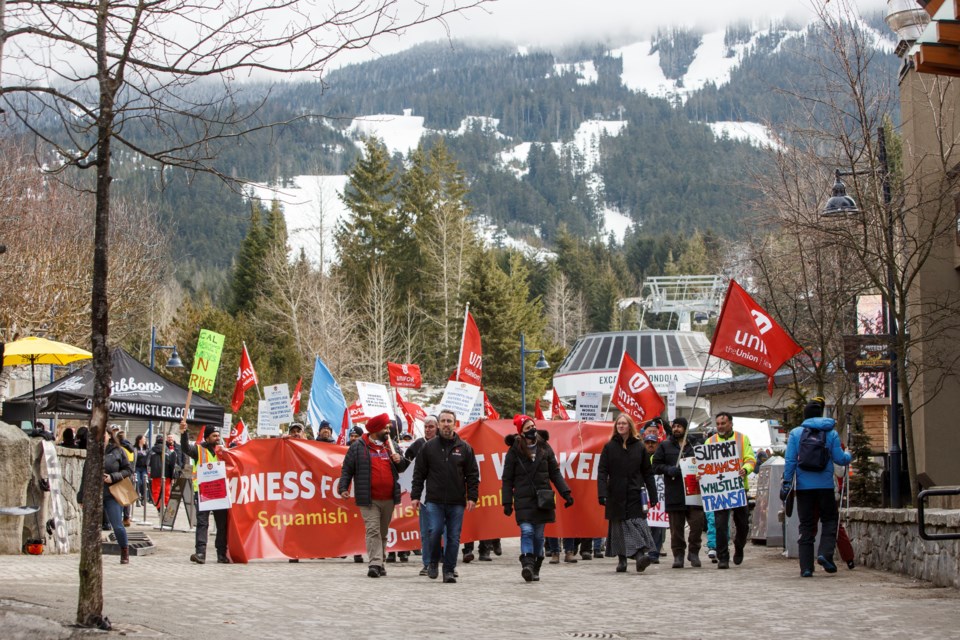Sea to Sky transit workers have reportedly rejected a tentative deal that would have ended the four-month-long transit strike, which looks set to make it the longest transit strike in B.C. history.
After its bargaining committee unanimously recommended the settlement package put forth by BC Transit contractor and employer Pacific Western Transportation (PWT) on Friday, May 27, Unifor Local 114 members turned down the offer Monday, May 30, a union representative confirmed.
Members rejected the agreement as PWT "failed to make enough progress on wage parity," Unifor said in a release.
“Members have the final say in adopting the contract that governs their working conditions,” said Gavin McGarrigle, Unifor's western regional director, in the release. “Clearly the employer fell short in closing the gap that exists between transit workers doing the same job in Vancouver and the Sea to Sky region.”
The parties were back to the table Friday with mediator Dave Schaub, and while progress had been made on extending benefits and the union's preferred pension plan to all local transit operators, achieving wage parity with Coast Mountain Bus Company workers in Vancouver has long been the major hurdle to cross.
In a statement Tuesday, May 31, PWT said the offer that was recommended by Unifor's bargaining committee included an increase in wages compared to its May 11 offer, with annual wage hikes of 1.5, two, three, three, and four per cent over the five-year term of the deal, resulting in a driver wage rate of $36.46 an hour. That's in addition to a two-per-cent signing bonus as well as employer-paid benefits for all employees and an agreement to transition to the union's preferred defined benefit pension plan, points that had been previously agreed upon in negotiations.
"We believe this was a fair final offer and trusted that the committee's recommendation to accept would yield a positive result in voting and allow a re-start of operations in the near future," PWT continued. "The Company will be evaluating its options in the next couple of days and will have further comments at that time."
In a lengthy open letter posted to its website Thursday, May 26, PWT's director of B.C. operations Steve Antil questioned the idea of wage parity given how much he said transit duties can differ across communities, and that Sea to Sky workers are already "close to the top of the heap" when it comes to wages.
"Only Coast Mountain Bus employees in Greater Vancouver receive significantly higher wages. Even within Metro Vancouver there are community bus drivers and Handy Dart Drivers providing services directly comparable to those in Sea to Sky that receive considerably less compensation than the Drivers in Sea to Sky for doing the same kind of work," Antil said in his statement.
"So is parity with Vancouver-based employees fair and reasonable? The argument from the Union is that the cost of living is similar, and the job is the same. While the first point is certainly arguable, it’s on the second point that the Union misses the mark. A transit driver isn’t simply a transit driver—it’s not the same job as in Metro Vancouver. In terms of the intangibles, the Sea to Sky has significant advantages for Transit Employees compared to heavily urbanized areas. Not the least of which is working for a smaller employer, where employees are able to talk with their managers every day. Driving in the city involves gruelling commutes, long split shifts, heavy city traffic, and health and safety concerns that drivers in the Sea to Sky deal with on a much smaller scale. Squamish, Whistler, and Pemberton offer a living experience that is not comparable to the major Urban centers, and that is why we choose to live here."
Now on its 122nd day, the job action will in all likelihood become the longest public transit strike in the province's history. In 2001, the Liberal government of the day legislated buses back onto the road after Metro Vancouver's record 123-day shutdown.
Check back with Pique for more.





